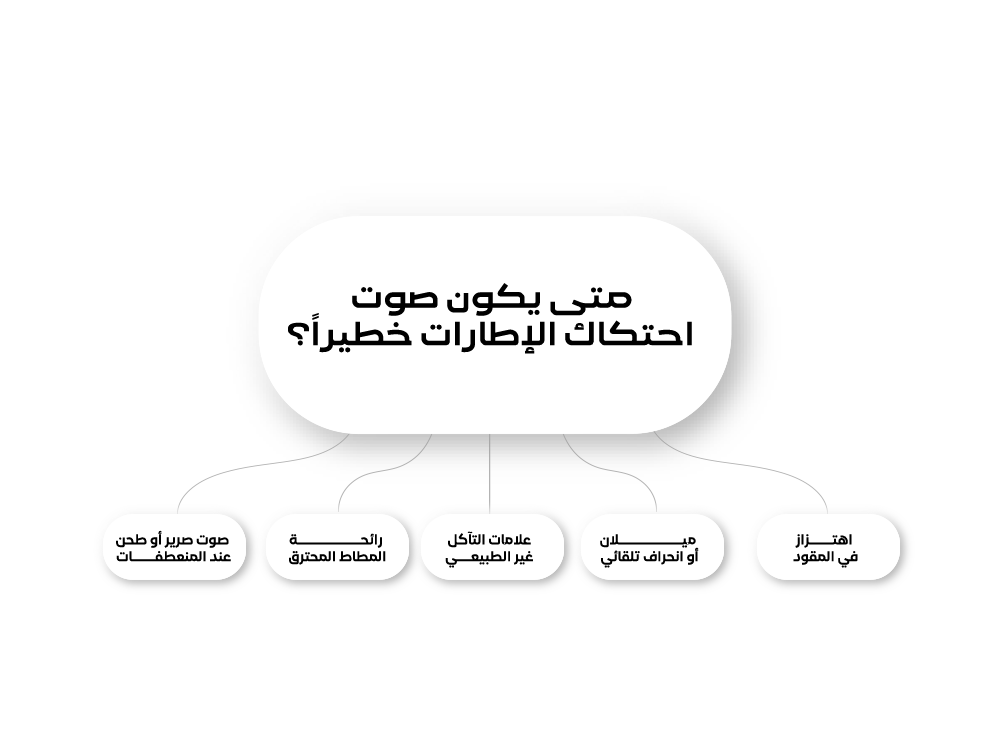When you hear the sound of tires rubbing against the asphalt or parts of the car, this is not just a passing annoyance. It may be a warning cry from your car and a clear message that tells you: “Something is wrong!”.
Imagine this scene: you are driving your car on your way to work in the morning, and suddenly you hear that sound coming from your tires at every turn or bump. Do you ignore it and continue on your way? Or do you realize that this is a danger sign that may cost you dearly if you ignore it?
The shocking fact is that 90% of drivers ignore these sounds at the beginning, only to discover later that they were driving a “time bomb” on the road!
This noise of friction may be an early warning of one of these risks: tire wear, serious suspension failure, or wear in vital parts of the car.
Before you regret it, let's find out together what your car tire is trying to tell you, what are the messages of that annoying sound and how can you interpret these signals before they turn into a real disaster?
Keep reading, because knowing this information may save your life one day!
The sound of tire friction may seem like just a passing noise, but it is in fact an early warning message sent by your car to warn you of real problems, starting with the use of inappropriate tires and ending with serious suspension failures. Ignoring this sound means ignoring a cry for help that may portend a disaster on the road.
The main causes of tire friction
From unsuitable tires to sudden suspension failures, here are the real causes of tire friction that make them cry out for help!
Inappropriate tire size
Did you know that installing inappropriate tires may put your safety at greater risk than you think? This is not only a matter of appearance, but also a safety issue that cannot be taken lightly.
When you choose a larger tire than recommended, the safe distance between the tire and the car body is seriously reduced, the frictional pressure on the fenders increases during bumps and turns, and may cause damage to the suspension system over time, in addition to having a negative impact on vehicle stability and emergency response.
The solution is It consists of: checking the car catalog to know the sizes andOptimal tire specifications, consulting a specialist technician before any change, choosing replacement tires within the allowed specifications, while monitoring voids after installation to ensure safety.
Incorrect wheel displacement
Have you noticed that your car wheels seem unbalanced? The displacement problem may be the cause of tire friction. What is wheel displacement?
Wheel displacement is the measure that determines the position of the wheel in relation to the axis of rotation. It determines: will the wheel be inward, protruding outward, or in the ideal position?
Accordingly, the problems caused by the wrong displacement are: friction with the fenders “when the wheel is protruding outward”, friction with the suspension components “when it is inward”, uneven tire wear, negative impact on vehicle stability, or increased load on the wheel bearing.
But how do you know that you have a wheel displacement problem? This happens when you hear a clear sound of friction when cornering, strange wear on the inner or outer edges of the tires, abnormal vibration while driving, or an unbalanced appearance of the wheels.
The solution is It consists of: professional inspection, use of a displacement measuring tool, comparing the results with the manufacturer's specifications, and remembering that changing the wheel displacement by only 5 mm may be the difference between safe driving and a possible disaster!
Suspension damage
If you feel that your car is no longer the same, the suspension system may be the main culprit behind the risk of tire friction, especially as the suspension system is your car's nervous system that maintains its balance and stability.
The question here is: how does suspension damage damage your tires? Specialists answer this with the collapse of shock absorbers, sagging springs or wear of the bushings.
The serious symptoms that alert you to the need for an urgent examination are: a “knock” sound when passing over bumps, oil leaking from the shock absorbers, the car leaning to one side, or the fluctuation of the steering wheel at high speeds.
Therefore, smart solutions include: comprehensive periodic inspection every 20,000 km or as recommended by the manufacturer, full replacement of shock absorbers when damaged, upgrading springs, especially if the car is carrying heavy loads, then wheel alignment after any suspension repair, provided that the tire balance is checked periodically to detect problems early.
Did you know that 50% of drivers are unaware that suspension damage may wear out their tires completely in just 10,000 km!
Body reduction modifications for the car
Specialists confirm that lowering the chassis may be the most dangerous decision for your car tires, at the same time that many seek an attractive sporty appearance and ignore the real risk of tire friction that may cost them their security and safety!
Reduction adjustments damage your tires through constant contact with the fenders, which causes premature tire wear and then exposure to critical safety issues, including: sudden tire explosion, loss of cornering control, or a serious increase in braking distance.
Specialists note that there are signs of tire wear from sound, which you should pay attention to, including:
- A sharp “creaking” sound when passing over bumps.
- Continuous buzzing while driving at high speeds.
- A metallic rattle at sharp turns.
- Intermittent friction sound when accelerating or braking.
You should also know that the impact of severe tire friction on safety is: loss of control in sharp turns, sudden car deviation on wet roads, premature brake wear due to overload, as well as increased fuel consumption up to 15%.
If you are determined to reduce and prefer your car to look sporty, you should consult a specialist in vehicle engineering, choose high-quality equipment, air suspension systems that allow height adjustment when needed, with weekly checks of the suspension system and tires. We also recommend keeping an extra safety distance while driving.
Damage to fenders and bushings
When your car fenders or wheel pads are damaged or deformed, this may cause a series of problems that directly affect your car tires. This problem often starts small, but may worsen over time if it is not treated promptly and appropriately.
Tire friction occurs when fenders lose their original shape due to minor impacts or accidents that may not be noticed by the driver at first. Loose or worn out bushings contribute to worsening the problem, as they allow excessive movement of the wheels, leading to repeated friction with parts of the car body. This constant friction not only causes annoying noise while driving, but may lead to uneven wear in the tires, especially in the side areas.
You can notice several warning signs that indicate the presence of this problem, such as: visible scratches on the inner sides of the tires, or hearing a distinctive friction sound when the steering wheel is fully turned.
You may notice unusual vibrations while driving, especially at medium speeds. In some advanced cases, rapid and irregular wear may be observed in the tire edges.
In order to solve this problem, it is recommended to follow several practical steps, including a comprehensive examination of the fenders to make sure they are straight and free of any distortions. You should also check the installation points of the fenders and ensure their safety.
It is also important to evaluate the condition of the bushings and replace any damaged parts, taking care to use original spare parts to ensure the best performance.
In order to prevent this problem, it is recommended to perform a periodic inspection every 10,000 kilometers, taking care to clean the wheel cavity regularly to remove any foreign objects that may cause damage to the bushings. Any minor abnormalities should be treated immediately before the problem worsens.
In any case, automotive experts stress the importance of not ignoring any signs of tire wear from sound, even if it is mild. They also recommend using certified spare parts to ensure a perfect fit with the car structure, with the need to perform a comprehensive engineering examination after any accident, even if it is simple in appearance.
And always remember that the cost of early repair is much lower than the costs that may result from Change tires Pretimely or repair minor faults caused by negligence.
When tires rub against the car body, they don't make a random sound, but send you a clear message that says: Something is out of place! Don't wait until the sound becomes an annoying problem or a sudden failure. Listen carefully to what your car is trying to say. Early intervention may save you from significant losses later.
How do you know that tire friction is dangerous?
After we have explained to you the main causes of tire friction, the most important question remains: How do you distinguish between normal and serious friction in your car tires?

The risk of tire friction is not one degree, but different degrees of severity. Some are only temporary discomfort and others may be a warning of an imminent disaster, so we will show you the crucial signs that portend a real danger:
Warning sounds
These are the sharp metallic sounds when cornering, not just a passing noise, especially when they turn from light whispers to a clear creak or grinding similar to the sound of brakes. This is the vehicle's language to tell you that tire friction has exceeded the safe limit.
The smell of burnt rubber
If you feel a smell like burnt tires after a short ride, especially when you get out of the car, this is a sign of intense friction causing the rubber to heat up seriously.
Signs of abnormal wear
It consists of irregular smooth areas on the sides of the tire, rubber lines hanging from the edges, or deep cracks in the sidewall. All these signs are an alarm that tells you about the end of the tire's life.
Strange car behavior
When you notice vibration in the steering wheel even on flat roads, the car automatically tilt to one side, or resistance in the steering wheel when cornering, these are all problems in the suspension system, which suffers from constant friction.
Now, here are 5 solutions to reduce the sound of tires rubbing against asphalt
- Stick to the vehicle's technical specifications when Tire selectionIgnoring the recommended sizes, even in small proportions, may cause serious problems.
- Adjust the tire angles, carefully taking into account the camber and caster angle, as an error of just half a degree may be enough to cause friction.
- Follow the preventive maintenance of the suspension system regularly, and replace worn parts with original ones.
- If you want to make modifications to the fenders, they should be supervised by a professional in order to protect the integrity of the structure.
- Adjust the height of the car according to the manufacturer's standards, taking into account the load distribution.
The sound of tire friction may seem simple, but in fact it is due to wrong technical choices or negligence in maintenance. Your adherence to sizes, wheel angles and height control may make the difference between safe driving and a costly problem!
Finally, do not ignore the sound of tire friction. It is more than an aesthetic problem. It is a real danger to car performance and safety. If any of the above signs appear, check your car with a specialist technician before the problem worsens.







